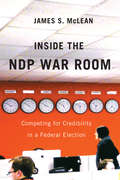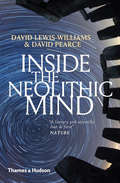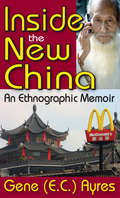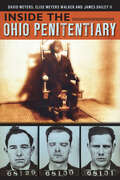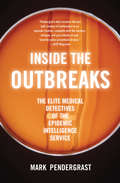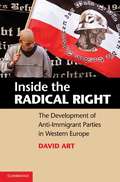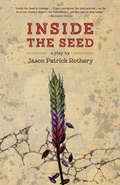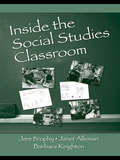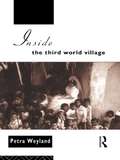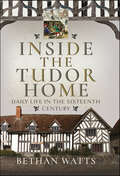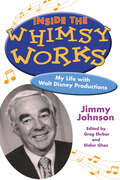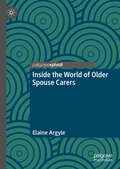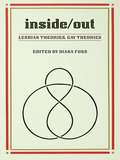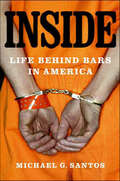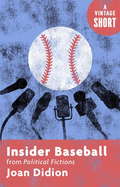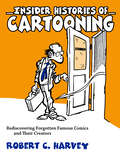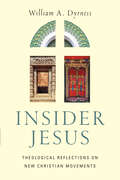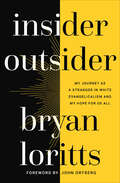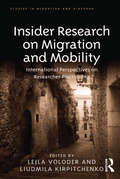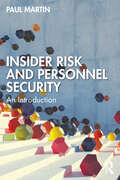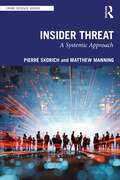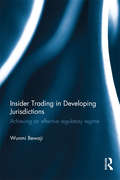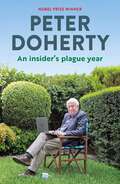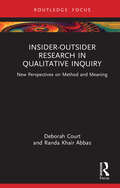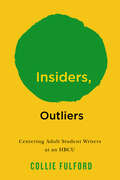- Table View
- List View
Inside the NDP War Room: Competing for Credibility in a Federal Election
by James S. McLeanThe federal election campaign of 2005-06 offered the usual mix of lofty rhetoric, competing interests, and skullduggery. Nonetheless, this campaign laid the foundation for a major shift in Canadian politics, bringing the Conservative Party to power and changing the balance of opposition parties. Inside the NDP War Room takes readers behind the scenes to investigate the nature of credibility in the complex communicative game of election campaigns. James McLean considers the ways in which the idea of credibility is used to explain how messages are crafted and articulated, how journalists are implicated, and what the Canadian public needs to know about what is at stake in the competition for votes. He talks to insiders about their communication practices and strategies, and reflects upon the grand narratives and small opportunistic moments brought before the Canadian public when power is up for grabs. A vivid, first-hand account of campaign strategizing, Inside the NDP War Room offers insights into the NDP breakthroughs of 2011, the full meaning of Quebec's "orange wave," and the future of a party preparing for a new reality.
Inside the Neolithic Mind: Consciousness, Cosmos, and the Realm of the Gods
by David Lewis-Williams David PearceAn exploration of how brain structure and cultural content interacted in the Neolithic period 10,000 years ago to produce unique life patterns and belief systems. What do the headless figures found in the famous paintings at Catalhoyuk in Turkey have in common with the monumental tombs at Newgrange and Knowth in Ireland? How can the concepts of "birth," "death," and "wild" cast light on the archaeological enigma of the domestication of cattle? What generated the revolutionary social change that ended the Upper Palaeolithic? David Lewis-Williams's previous book, The Mind in the Cave, dealt with the remarkable Upper Palaeolithic paintings, carvings, and engravings of western Europe. Here Dr. Lewis-Williams and David Pearce examine the intricate web of belief, myth, and society in the succeeding Neolithic period, arguably the most significant turning point in all human history, when agriculture became a way of life and the fractious society that we know today was born. The authors focus on two contrasting times and places: the beginnings in the Near East, with its mud-brick and stone houses each piled on top of the ruins of another, and western Europe, with its massive stone monuments more ancient than the Egyptian pyramids. They argue that neurological patterns hardwired into the brain help explain the art and society that Neolithic people produced. Drawing on the latest research, the authors skillfully link material on human consciousness, imagery, and religious concepts to propose provocative new theories about the causes of an ancient revolution in cosmology and the origins of social complexity. In doing so they create a fascinating neurological bridge to the mysterious thought-lives of the past and reveal the essence of a momentous period in human history. 100 illustrations, 20 in color.
Inside the New China: An Ethnographic Memoir
by Gene AyresChina is no longer a Third World country. It is now the world's fastest growing economy. Even after the 2008 Olympics, this fact may come as a shock to many Americans, who continue to think that the Chinese still march around in brown uniforms with red stars on their caps arresting dissidents for wearing capitalist Levis. China has at last count, more than half a billion cell phone users. Indeed, the Chinese are not only the world's leading users of mobile phones, but also the leading suppliers. No Chinese student goes without one and even a donkey cart driver chatting away on a mobile is not an uncommon sight.China's educated New Generation is possibly the most highly motivated force since the post-World War II generation in America. The young people of China are the next wave of a flourishing Chinese middle class now estimated as 13.5 % of the population, and expected to be 600 million strong by 2015, according toBusiness Week. These young people want to drive cars like ours, live in houses like ours, own condos near the beach, wear designer clothes, and carry cell phones, iPods, camcorders, digital cameras, and MP3 players, just like Americans. Tens of millions already do.During a thirty-month stay in Chinabetween 2004 and 2007, Ayres was presented to soldiers straight out of boot camp, toasted by military generals and governors, invited to parties with local leaders as a ""foreign expert and dignitary,"" and begged to counsel dissidents and the lovelorn. He rode buses jammed with peasants hoping that they would actually be paid at the end of the month. He dickered with farmers in open markets and street vendors desperate to make ends meet. He dealt with smooth, savvy merchants in upscale department stores; and debated policy with Communist Party bosses. This revised paperback edition of the author's earlier work, A Billion to One, is a vivid, intimate account of China as it is today.
Inside the Ohio Penetentiary (Landmarks)
by David Meyers Elise Meyers Walker James Dailey IIExplore one of history&’s most notorious maximum-security prisons through these tales of mayhem and madness. As &“animal factories&” go, the Ohio Penitentiary was one of the worst. For 150 years, it housed some of the most dangerous criminals in the United States, including murderers, madmen and mobsters. Peer in on America&’s first vampire, accused of sucking his victims&’ blood five years before Bram Stoker&’s fictional villain was even born; peek into the cage of the original Prison Demon; and witness the daring escape of John Hunt Morgan&’s band of Confederate prisoners.
Inside the Outbreaks: The Elite Medical Detectives of the Epidemic Intelligence Service
by Mark PendergrastThe &“fascinating&” story of the CDC&’s intrepid investigators, who travel the world to protect us from deadly pathogens (Chicago Tribune). Since its founding in 1951, the Epidemic Intelligence Service has waged war on every imaginable ailment. When an epidemic hits, the EIS will be there to crack the case, however mysterious or deadly, saving countless lives in the process. Over the years they have successfully battled polio, cholera, and smallpox, to name a few, and in recent years have turned to the epidemics killing us now—smoking, obesity, and gun violence among them. The successful EIS model has spread internationally: former EIS officers on the staff of the Centers for Disease Control have helped to establish nearly thirty similar programs around the world. EIS veterans have gone on to become leaders in the world of public health in organizations such as the World Health Organization. Inside the Outbreaks takes readers on a riveting journey through the history of this remarkable organization, following Epidemic Intelligence Service officers on their globetrotting quest to eliminate the most lethal and widespread threats to the world&’s health.
Inside the Radical Right: The Development of Anti-Immigrant Parties in Western Europe
by David ArtWhat explains the cross-national variation in the radical right's electoral success over the last several decades? Challenging existing structural and institutional accounts, this book analyzes the dynamics of party building and explores the attitudes, skills and experiences of radical right activists in eleven different countries. Based on extensive field research and an original data set of radical right candidates for office, David Art links the quality of radical right activists to broader patterns of success and failure. He demonstrates how a combination of historical legacies and incentive structures produced activists who helped party building in some cases and doomed it in others. In an age of rising electoral volatility and the fading of traditional political cleavages, Inside the Radical Right makes a strong case for the importance of party leaders and activists as masters of their own fate.
Inside the Seed
by Jason Patrick RotheryWinner of the 2015 Jessie Richardson Award for Outstanding Original ScriptInside the Seed examines the way corporate, institutionalized systems can exert a corrosive, corruptive influence on even the most magnanimous and well-intentioned individual.Jason Rothery is a playwright and collaborative creator with diverse Canadian theater festivals and production companies.
Inside the Social Studies Classroom
by Barbara Knighton Jere Brophy Janet AllemanEDUCATION/ SOCIAL STUDIES "… a much-needed addition to elementary social studies that will move the field ahead." Keith C. Barton, University of Cincinnati "This text fills a valuable niche and should quickly become a leading reference for teachers and teacher educators." Linda S. Levstik, University of Kentucky This book, resulting from a collaboration among an educational psychologist, a social studies educator, and a primary teacher, describes in rich detail and illustrates with excerpts from recorded lessons how primary teachers can engage their students in social studies lessons and activities that are structured around powerful ideas and have applications to their lives outside of school. The teaching portrayed connects concepts and skills emphasized in national and state standards, taught in ways that build on students’ prior experiences in their local communities and connect with their family backgrounds and home cultures. The analyses include rich descriptions of the teacher-student interactions that occur during lessons, detailed information about how and why the teacher adapted lesson plans to meet her students’ background experiences and adjusted these plans to take advantage of teachable moments that emerged during lessons, and what all of this might imply concerning principles of practice. The principles are widely applicable in elementary schools across the country, as well as across the curriculum (not just in social studies) and across the elementary grades (not just the primary grades).
Inside the Third World Village
by Petra WeylandFirst Published in 2004. Routledge is an imprint of Taylor & Francis, an informa company.
Inside the Tudor Home: Daily Life in the Sixteenth Century
by Bethan WattsInside the Tudor Home sheds light on how people lived in the sixteenth century from plush royal palaces to wattle-and-daub cottages and everything in between. Power. Politics. Prosperity. Plague. Tudor England; a country replete with sprawling landscapes, dense forests and twisting urban labyrinths. This is a place of stagnation and of progress; of glorious cultural revolution, where the wheel of fortune is forever turning. From the plush royal palaces to the draughtiest of wattle-and-daub cottages, sixteenth-century England revolved around the people who formed the beating heart of Tudor society. These people celebrated scientific progress and lamented religious persecution; championed the rights of women and the underrepresented; fell in love with sweethearts, cared for pets and mourned the deaths of their loved ones. In her first book, Bethan Catherine Watts sheds light on the Tudor home and the everyday lives of those who lived there.
Inside the Whimsy Works: My Life with Walt Disney Productions
by Jimmy JohnsonIn this never-before-published memoir from the files of The Walt Disney Archives, Disney Legend Jimmy Johnson (1917-1976) takes you from his beginnings as a studio gofer during the days of Snow White and the Seven Dwarfs to the opening of Walt Disney World Resort. Johnson relates dozens of personal anecdotes with famous celebrities, beloved artists, and, of course, Walt and Roy Disney. This book, also the story of how an empire-within-an-empire is born and nurtured, traces Johnson’s innovations in merchandising, publishing, and direct marketing, to the formation of what is now Walt Disney Records. This fascinating autobiography explains how the records helped determine the course of Disney Theme Parks, television, and film through best-selling recordings by icons such as Annette Funicello, Fess Parker, Julie Andrews, Louis Armstrong, and Leopold Stokowski and the Philadelphia Orchestra. Through Jimmy Johnson’s remarkable journey, the film, TV, and recording industries grow up together as changes in tastes and technologies shape the world, while the legacy of Disney is developed as well as carefully sustained for the generations who cherish its stories, characters, and music.
Inside the World of Older Spouse Carers
by Elaine ArgyleThis book explores the experiences of older people who provide care within marriage, highlighting the neglected role of older spouse carers and the positive social contributions they make. Drawing on relevant data, literature and research including in-depth interviews conducted with 26 older spouse carers, the author challenges classed, gendered, and other assumptions and expectations around older age and unpaid caring. These include the beliefs that older age is a time of passivity and dependency, that caring is a primarily female role that transcends class divides and that this caring is a normal part of the spousal relationship and not worthy of special attention. In addition to challenging these assumptions, the book will consider the implications of findings for service provision. This book will be of interest to scholars and researchers in Social Care, Sociology, Gerontology, and Gender Studies. In addition, practitioners and policy makers may also find this book of interest.
Inside/Out: Lesbian Theories, Gay Theories
by Diana FussLesbians and gays have gone from "coming out," to "acting up," to "outing," meanwhile radically redefining society's views on sexuality and gender. The essays in Inside/Out employ a variety of approaches (psychoanalysis, deconstruction, semiotics, and discourse theory) to investigate representations of sex and sexual difference in literature, film, video, music, and photography. Engaging the figures of divas, dykes, vampires and queens, the contributors address issues such as AIDS, pornography, pedagogy, authorship, and activism. Inside/Out shifts the focus from sex to sexual orientation, provoking a reconsideration of the concepts of the sexual and the political.
Inside: Life Behind Bars in America
by Michael G. SantosAmerican jails and prisons confine nearly 13.5 million people each year, and it is estimated that 6 to 7 percent of the U.S. population will be confined in their lifetimes. Despite these disturbing numbers, little is known about life inside beyond the mythology of popular culture.Michael G. Santos, a federal prisoner nearing the end of his second decade of continuous confinement, has dedicated the last eighteen years to shedding light on the lives of the men warehoused in the American prison system. Inside:Life Behind Bars in America, his first book for the general public, takes us behind those bars and into the chaos of the cellblock. Capturing the voices of his fellow prisoners with perfect pitch, Santos makes the tragic--- and at times inspiring---stories of men from the toughest gang leaders to the richest Wall Street criminals come alive. From drug schemes, murders for hire, and even a prostitution ring that trades on the flesh of female prison guards, this book contains the never-before-seen details of prison life that at last illuminate the varied ways in which men experience life behind bars in America.
Insider Baseball: from Political Fictions
by Joan DidionA Vintage Shorts Selection Almost three decades ago, iconic and incomparable American essayist Joan Didion's now-classic report from the Dukakis campaign trail exposed, in no uncertain terms, the complete sham that is the modern American presidential run. Writing with bite and some humor too, Didion betrays "the process"--the way in which power is exchanged and the status quo is maintained. All insiders--politicians, journalists, spin doctors--participate in a political narrative that is "designed as it is to maintain the illusion of consensus by obscuring rather than addressing actual issues." The optics of presidential campaigns have grown ever more farcical and remote from the needs and issues most relevant to Americans' lives, and Didion's elegant, shrewd, and prescient commentary has never been more urgent than it is right now. An ebook short.
Insider Histories of Cartooning: Rediscovering Forgotten Famous Comics and Their Creators
by Robert C. HarveyMany fans and insiders alike have never heard of Bill Hume, Bailin' Wire Bill, Abe Martin, AWOL Wally, the Texas History Movies, or the Weatherbird at the St. Louis Post-Dispatch. And many insiders do not know why we call comic books “comics” even though lots of them are not at all funny. Robert C. Harvey, cartoonist and a veteran comics critic, author of several histories of comics and biographies of cartoonists, tells forgotten stories of a dozen now obscure but once famous cartoonists and their creations. He also includes accounts of the cartooning careers of a groundbreaking African American and a woman who broke into an industry once dominated by white men. Many of the better-known stories in some of the book's fourteen chapters are wrapped around fugitive scraps of information that are almost unknown. Which of Bill Mauldin's famous duo is Willie? Which is Joe? What was the big secret about E. Simms Campbell? Who was Funnyman? And why? And some of the pictures are rare, too. Hugh Hefner's cartoons, Kin Hubbard's illustrations for Short Furrows, Betty Swords’s pictures for the Male Chauvinist Pig Calendar of 1974, the Far East pin-up cartoon character Babysan, illustrations for Popo and Fifina, and Red Ryder's last bow.
Insider Jesus: Theological Reflections on New Christian Movements
by William A. DyrnessChristianity Today's 2017 Book of the Year Award of Merit - Missions/Global Church
Insider Outsider: My Journey as a Stranger in White Evangelicalism and My Hope for Us All
by Bryan LorittsPastor Bryan Loritts dives deep into what it's like to be a person of color in predominantly white evangelical spaces today and where we can go from here.God boldly proclaims throughout the book of Acts that there is no "ethnic home team" when it comes to Christianity. But the minority experience in America today--and throughout history--too often tells a different story.As Loritts writes, "It is impossible to do theology devoid of cultural lenses and expressions. Like an American unaware of their own accent, most whites are unaware of the ethnic theological accent they carry." Insider Outsider bears witness to the true stories that often go untold--stories that will startle, enlighten, and herald a brighter way forward for all seeking belonging in the family of God.This seminal book on race and the church will help Christians discover:How they can learn the art of listening to stories unlike their ownIdentify the problems and pitfalls that keep Sunday morning the most segregated hour of the weekAnd participate in an active movement with God toward a holy vision of what Dietrich Bonhoeffer calls "life together"Drawing on insightful snapshots through history, eye-opening personal experiences, and biblical exposition, Loritts awakens both our minds and hearts to the painful reality of racial divides as well as the hope of forgiveness.
Insider Research on Migration and Mobility: International Perspectives on Researcher Positioning (Studies in Migration and Diaspora)
by Lejla Voloder Liudmila KirpitchenkoWith an increasing proportion of migration and mobility field studies being conducted by migrants and members of ethnic minorities in 'home' contexts, the implications of 'insider research' are increasingly subject critical scrutiny. Researchers who may share migration experiences or cultural, ethnic, linguistic or religious identities with their participants are exploring the means, ethics and politics of mobilizing ’insider capital’ for the purpose of gaining access to and representing research participants. Bringing together the latest international scholarship in the sociology and anthropology of migration, this volume explores the complexities, joys and frustrations of conducting ’insider’ research. The book offers analyses of key methodological, ethical and epistemological challenges faced by migration researchers as they question the ways in which they come to identify with their research topic or their participants. Addressing questions of identity and categorization, ethics and methodology, epistemology and situated knowledge, Insider Research on Migration and Mobility will appeal to scholars across the social sciences with interests in migration, mobilities, diaspora studies and ethnic and racial identities, as well as those interested in qualitative research design and analysis.
Insider Risk and Personnel Security: An introduction
by Paul MartinThis textbook analyses the origins and effects of insider risk, using multiple real-life case histories to illustrate the principles, and explains how to protect organisations against the risk. Some of the most problematic risks confronting businesses and organisations of all types stem from the actions of insiders – individuals who betray trust by behaving in potentially harmful ways. Insiders cause material damage to their employers and society, and psychological harm to the colleagues and friends they betray. Even so, many organisations do not have a systematic understanding of the nature and origins of insider risk, and relatively few have a coherent and effective system of protective security measures to defend themselves against that risk. This book describes the environmental and psychological factors that predispose some individuals to become harmful insiders, and the most common pathways by which this happens. It considers how aspects of insider risk have been altered by shifts in society, including our increasing reliance on technology and changes in working patterns. The second half of the book sets out a practical systems-based approach to personnel security – the system of defensive measures used to protect against insider risk. It draws on the best available knowledge from industry and academic research, behavioural science, and practitioner experience to explain how to make personnel security effective at managing the risk while enabling the conduct of business. This book will be essential reading for students of risk management, security, resilience, cyber security, behavioural science, HR, leadership, and business studies, and of great interest to security practitioners.
Insider Threat: A Systemic Approach (Crime Science Series)
by Matthew Manning Pierre SkorichEstablishing a new framework for understanding insider risk by focusing on systems of organisation within large enterprises, including public, private, and not-for-profit sectors, this book analyses practices to better assess, prevent, detect, and respond to insider risk and protect assets and public good.Analysing case studies from around the world, the book includes real-world insider threat scenarios to illustrate the outlined framework in the application, as well as to assist accountable entities within organisations to implement the changes required to embed the framework into normal business practices. Based on information, data, applied research, and empirical study undertaken over ten years, across a broad range of government departments and agencies in various countries, the framework presented provides a more accurate and systemic method for identifying insider risk, as well as enhanced and cost-effective approaches to investing in prevention, detection, and response controls and measuring the impact of controls on risk management and financial or other loss.Insider Threat: A Systemic Approach will be of great interest to scholars and students studying white-collar crime, criminal law, public policy and criminology, transnational crime, national security, financial management, international business, and risk management.
Insider Trading in Developing Jurisdictions: Achieving an effective regulatory regime
by Wunmi BewajiThe book examines the regulation of insider dealing in the developed jurisdictions, using three of the G7 countries as guides with the aim of knowing how they have regulated insider trading and what lessons can be learnt from their failures and achievements. It looks at regulatory regimes in the US, the UK and Japan in order to consider whether these regimes can be successfully transplanted to developing countries. In order to explore insider dealing in the developing world the book focuses on Nigeria, Africa’s most populous nation and second largest economy. This book examines in theoretical and empirical terms the law on insider trading away from the dogmatic approach of Western literature by presenting the subject from the prism of a developing jurisdiction in post-colonial Africa with a divergent cultural, historical, social, political and economic background. The author analyses what shape insider dealing takes in Nigeria, a predominantly illiterate society, and considers the groups involved. The books also explores how the concept of insider dealing regulation is understood amongst parties integral to its administration and enforcement such as lawyers, judges, stockbrokers, and ordinary investors. The legislation governing insider dealing regulation in Nigeria is critically examined to expose its strengths and weaknesses, and to see how foreign provisions and legislation have been incorporated. The book uses Nigerian experiences to consider its implications for other developing nations, arguing that regulatory regimes need to take into account the specific social, political, historical and economic factors of a particular locale rather than importing regulations wholesale from developed jurisdictions.
Insider's Plague Year
by Peter DohertyIn An Insider's Plague Year, Nobel laureate and prominent COVID-19 authority Professor Peter Doherty recounts his response to the pandemic as it developed from January 2020-February 2021. As citizens and governments around the world suddenly became acutely dependent on the capacity of scientists to understand and recommend appropriate public health policy responses to the disease, Doherty and his team were at the forefront. In his always conversational style, Doherty systematically provides a deep understanding of the virus and of the numerous areas of knowledge that have been brought together in the fight against it. Rendering complex medical and scientific issues accessible and providing a fascinating glimpse into how health experts have worked with governments to control and manage the challenge, Doherty also turns his mind to what we can hope for in the months and years ahead, considering even larger questions about the pivotal role of science in our lives.
Insider-Outsider Research in Qualitative Inquiry: New Perspectives on Method and Meaning
by Deborah Court Randa Khair AbbasInsider-Outsider Research in Qualitative Inquiry: New Perspectives on Method and Meaning explores the history, practice and particular benefits of conducting cultural research through a partnership of two researchers: one who is an insider to the culture under study and one who is an outsider. This book unpacks terminology around this type of research that has become outdated or cumbersome, looks at ethical issues and suggests specific methodological approaches. It also locates insider-outsider research, which is by its nature qualitative, in the wider research landscape. The authors specifically describe a researcher partnership, a relationship more intimate and fruitful than a team, much greater than the sum of its parts. Through their own nearly twenty-year research partnership and study of the Israeli Druze, the authors have developed mutual trust that has led to new depths of insight in understanding cultural codes and the meanings they embody. This, and the methods they use, will be illustrated through examples of some of their studies with the Israeli Druze. A highly accessible guide, this book will be of interest to ethnographers and other qualitative researchers, both graduate students and researchers of all levels of experience.
Insiders, Outliers: Centering Adult Student Writers at an HBCU (The American Campus)
by Collie FulfordInsiders, Outliers invites readers into the lives of adult HBCU students for whom college is one meaningful activity among many. Although adults over the age of twenty-four comprise a quarter of all undergraduates, they are institutionally segregated and only partially served by a US higher education system that remains organized around traditional-aged learners. Even as such students are regarded as a market for postsecondary institutions, they are routinely marginalized by institutional barriers. Students’ stories of their personal, professional, community, and academic writing experiences illuminate a critical need for more age-inclusive practices across academia. Their cases also offer new conceptual models of writing as an ethical and emotional practice that fuels changes for individuals and the people and institutions that they care about—including higher education. What adult students reveal about writing across their life domains has powerful implications for conceptualizing writing as a complex form of agency and for teaching writing across the curriculum.
